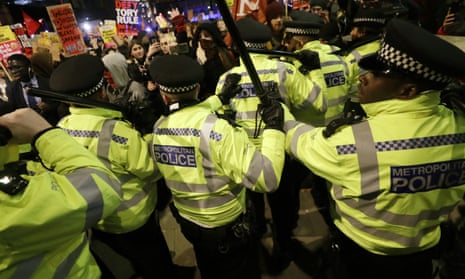The police watchdog has warned that public confidence is being damaged with officers “rumbled” for struggling to investigate crimes – such as burglary – and by stop and search, which is 10 times more likely to target black people than white.
Her Majesty’s Inspectorate of Constabulary and Fire & Rescue Services (HMICFRS) said the public is increasingly not bothering to report certain crime types, generally less serious offences such as car crime.
Matt Parr, HM Inspector of Constabulary, warned victims faced varying chances of their reported crimes being investigated, depending on where they lived. The low level but more frequently occurring offences are known as “volume crimes”.
While policing generally is in good shape, the inspectorate said, forces face pressures from a decline in resources coupled with rising demands. The inspectorate is criticised by many in policing for being slow to speak out about government cuts.
Parr said public faith in policing was in jeopardy: “I think these levels of volume crime resolution are corrosive for the long-term relationship between the public and police.
“There are some worrying trends – victims of domestic abuse, sexual assault, where victims are no longer supporting the prosecution – is a more complex and worrying issue.
“But I think particularly in the volume crime area the public has rumbled that the police capacity to deal with this is extremely limited. There are some strikingly low figures about car crime resolution meaning most of the public simply give up reporting it because the chances of anything positive happening are so slim.”
Parr said questions needed to be asked:“whether we, as a society, are prepared to tolerate a situation where so much volume crime isn’t properly investigated”.
Following an inspection of all 43 forces in England and Wales, a HMICFRS report, Divergence Under Pressure, noted the decline in the number of crimes reported which led to a criminal charge: “The likelihood of the police bringing someone to justice following a criminal investigation is decreasing. In England and Wales, a suspect was charged in 7.8% of recorded crimes last year, down from 9.1% the year before.”
The police inspectorate also warned that stop and search could damage the already low confidence black Britons have in policing. Stop and search is rising as a response to concerns about violent crime. Police believe it is essential but the vast majority of stops do not lead to an offence being detected and the inspectorate warned of massive disproportionality for black people: “The negative effect of poor police and community relations should not be underestimated.”
The inspectorate found that the worst forces for investigating crimes were Cleveland, Northamptonshire, Warwickshire and West Mercia.
